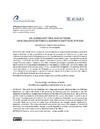Please use this identifier to cite or link to this item:
https://accedacris.ulpgc.es/handle/10553/70478
| DC Field | Value | Language |
|---|---|---|
| dc.contributor.author | Rangel López, Asunción del carmen | en_US |
| dc.date.accessioned | 2020-02-22T08:50:13Z | - |
| dc.date.available | 2020-02-22T08:50:13Z | - |
| dc.date.issued | 2016 | en_US |
| dc.identifier.issn | 2386-8635 | en_US |
| dc.identifier.uri | https://accedacris.ulpgc.es/handle/10553/70478 | - |
| dc.description.abstract | Este artículo sienta las bases de una investigación de largo recorrido en donde se postula la siguiente hipótesis: el sujeto que habita en los poemas del peruano José Watanabe es un sujeto que confecciona saberes a través de elementos que están fuera del marco de la escritura, es decir, los consejos y las pequeñas historias de la familia o de la comunidad, lo que habita y surge —para decirlo con uno de sus versos— “en la honda boca de los mayores”. Otro aspecto que se analiza en este artículo es la manera en que Watanabe conoce el mundo y, sobre todo, el mundo que inaugura su palabra, la cual involucra una dimensión de la experiencia constantemente contrapuesta y confrontada con ciertos saberes que pertenecen al marco de la escritura, como la física, la matemática, la lingüística o la medicina. El tipo de sujeto que habita en los poemas de Watanabe se encuentra en las antípodas de esta forma de conocimiento; la sapiencia que en su poesía se transmite depende de la propia experiencia del sujeto y de lo que bulle desde “la honda boca de los mayores”. | en_US |
| dc.description.abstract | This article lays the foundation for a long-term research which postulates the following hypothesis: the subject who dwells in the poems by the Peruvian poet Jose Watanabe is one that manufactures knowledge through elements found outside of the writing framework, i.e., pieces of advice and the family or community short stories, that which inhabits in, and arises from—to put it in one of his verses—“the deep mouth of the eldest”. This article also addresses Watanabe’s way of understanding the world, especially the world opened through his word, which involves a dimension of experience that constantly stands in opposition to certain types of knowledge, for example, physics, mathematics, linguistics, or medicine. The subject who dwells in Watanabe’s poems is at the antipodes of this kind of knowledge. The wisdom transmitted through his poetry depends on both the personal experience of the subject and that which comes out from “the deep mouth of the eldest”. | en_US |
| dc.language | spa | en_US |
| dc.relation.ispartof | Philologica canariensia | en_US |
| dc.source | Philologica canariensia [ISSN 2386-8635], n. 22, p. 43-54 | en_US |
| dc.subject | 550510 Filología | en_US |
| dc.subject | 570107 Lengua y literatura | en_US |
| dc.subject.other | Poesía peruana | en_US |
| dc.subject.other | Poesía y experiencia | en_US |
| dc.subject.other | Escritura | en_US |
| dc.subject.other | Parábola | en_US |
| dc.subject.other | Consejo | en_US |
| dc.subject.other | Peruvian poetry | en_US |
| dc.subject.other | Poetry and experience | en_US |
| dc.subject.other | Writing | en_US |
| dc.subject.other | Parable | en_US |
| dc.subject.other | Advice | en_US |
| dc.title | Los saberes que tarja José Watanabe. Consideraciones en torno a algunos momentos de su poesía | en_US |
| dc.type | Article | en_US |
| dc.type | info:eu-repo/semantics/article | en_US |
| dc.identifier.doi | 10.20420/PhilCan.2016.102 | en_US |
| dc.investigacion | Artes y Humanidades | en_US |
| dc.type2 | Artículo | en_US |
| dc.identifier.ulpgc | Sí | es |
| dc.description.esci | ESCI | |
| dc.description.dialnetimpact | 0,0 | |
| dc.description.dialnetq | Q3 | |
| dc.description.dialnetd | D6 | |
| dc.description.erihplus | ERIH PLUS | |
| item.fulltext | Con texto completo | - |
| item.grantfulltext | open | - |
| Appears in Collections: | Artículos | |
Page view(s)
127
checked on Mar 15, 2025
Download(s)
177
checked on Mar 15, 2025
Google ScholarTM
Check
Altmetric
Share
Export metadata
Items in accedaCRIS are protected by copyright, with all rights reserved, unless otherwise indicated.
